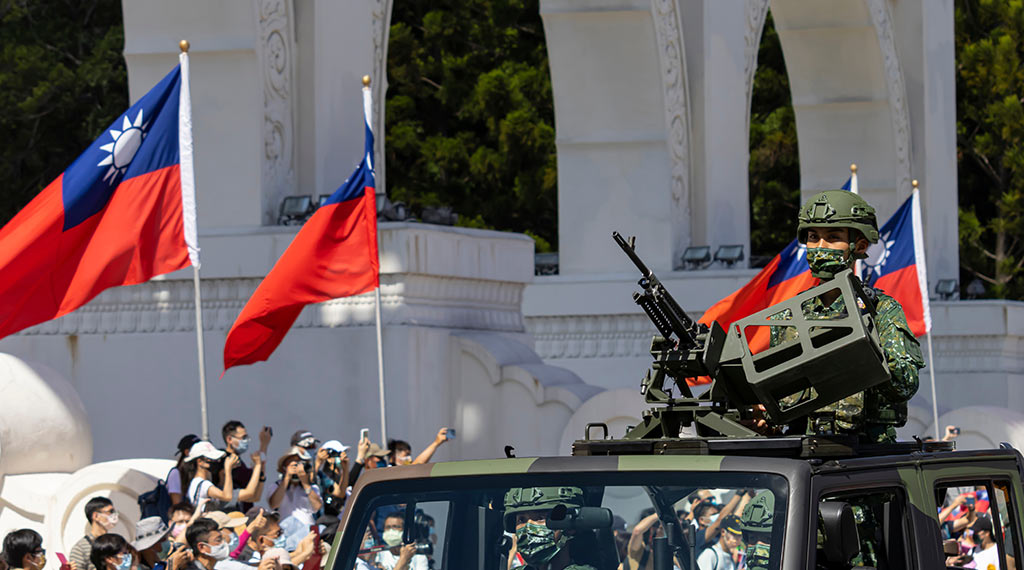
Sometimes one thinks Taiwan’s defense is just a question of hardware. Buy or build this-and-that weapon in the right quantities, and don’t buy or build this-and-that weapon—and all will be fine. The Chinese will be deterred.
And just about every American analyst, official, and commentator say they know exactly what Taiwan needs.
A recent article in the Texas National Security Review calls for “a large number of small things” as the solution for Taiwan. And they describe a detailed laundry list of weaponry best suited for Taiwan’s defense.
Now to be clear: hardware matters, and the right sorts of weapons, properly employed, would make Taiwan a tough nut to crack—or a “porcupine,” as is frequently described. The thrashing that Hezbollah gave the Israeli military during the 2006 Israeli assault on Lebanon ought to give even the most “dominant” military second and third thoughts. Switzerland has been coasting on a similar reputation for decades, if not centuries.
Taiwan would indeed do well to have long-range precision weapons, missiles, mines (especially “smart” mines), weaponized unmanned aerial and undersea vehicles, sophisticated anti-air weapons, sensor-fused munitions, and other weapons that are hard to target and can inflict damage and casualties at long distances.
How many are needed? A lot. A more precise figure: “one more.”
But national defense isn’t just hardware. And a discussion of Taiwan’s defense ought to always keep the following in mind.
Chinese Political and Psychological Warfare
Chinese political warfare and subversion against Taiwan (and against Taiwan’s allies) is as serious a threat as the People’s Liberation Army’s (PLA) growing assault force. Beijing used social media and other media and influencers to elect its man as mayor of Kaohsiung, Taiwan’s second largest city, in 2018. He made a serious run for president two years later. Fortunately, Taiwan’s government had woken to the threat after the Kaohsiung surprise—but it has not gone away.
If Chinese political and psychological warfare isn’t effectively countered and manages to erode Taiwan’s defenses, hardware and weaponry won’t matter much. Chinese political warfare is also directed—and usually successfully—against the United States, Taiwan’s main backer. Professor Kerry Gershaneck detailed all this in his book “Media Warfare: Taiwan’s Battle for the Cognitive Domain.”
Military Service in Taiwan
Military service in Taiwan is not a respected profession, and the serf-like treatment the military receives undermines Taiwan’s defense. It’s underfunded, underappreciated, and, until recently, has not been an urgent priority for Taiwan’s government. People matter as much as weapons.
Taiwan has a shambolic—and ineffective—military reserve system and no “civil defense” scheme. This is inexcusable. A civil defense scheme and a military reserve system give the average citizen an awareness of the threats and a stake in the nation’s defense. Without them, a mindset takes hold—as it has in Taiwan—that “someone else will take care of it.”
Even if Taiwan has the right “hardware,” it must employ it properly. This requires new ways of thinking—or operational concepts—on the part of Taiwan’s top officers. Taiwan’s military isn’t the only one where, in general, the higher one rises in rank the more one’s thinking calcifies. Younger Taiwanese officers know what needs to be done. But being a Confucian society, in Taiwan’s military the “old-fashioned” senior officers call the shots and the younger officers, who know a different approach to defense is needed, don’t (or can’t) say anything.
A ‘Galapagos Military’
Taiwan’s military is in most respects a “Galapagos military”—“isolated” since 1979 and forced to evolve on its own as best it can. The American military has—with only a few rare and small-scale exceptions—refused to conduct joint training with Taiwan’s armed forces.
It’s hard to put up a serious defense when you feel like you have no friends—and equally hard for a military to improve its capabilities operating by itself. Will the Americans go first and break the isolation? There’s a lot of talk, but no real sign of it. Seems some are still too afraid of China, and a sizeable constituency even blames Taiwan for not doing enough (or doing the “right” things) to defend itself. Do so, they imply, and only then the Americans might consider treating you like a friend. This is not exactly a confidence builder for Taiwan’s military or its civilian population.
Taiwan-US Free Trade Agreement
A Free Trade Agreement (FTA) with the United States would help with Taiwan’s defense—and bolster civilian morale. Indeed, an FTA would be worth a few squadrons of F-35’s. Former President Donald Trump’s trade officials apparently declined to move on this since they were “busy” with China. Being civil servants, they were perhaps unfamiliar with the words “work overtime.”
An FTA would probably give a nice jolt to Taiwan’s economy, thus improving job prospects for young Taiwanese—and maybe encouraging them to procreate and produce more Taiwanese, who are in short supply.
So, as you can see, there’s more to defending Taiwan than sending out procurement officers with credit cards and bags of money to buy the right weapons. Hardware is indispensable, of course, but is not a magic solution. Rather, it is one piece of a ten-piece puzzle when a nation’s defense is on the line.
Views expressed in this article are the opinions of the author and do not necessarily reflect the views of The Epoch Times.
- Don’t trust U.K. on Diego Garcia - February 18, 2026
- United States-Japan alliance: reducing burdens or winning wars? - February 14, 2026
- Freeing Iran requires a push from the US – and fast - February 13, 2026
